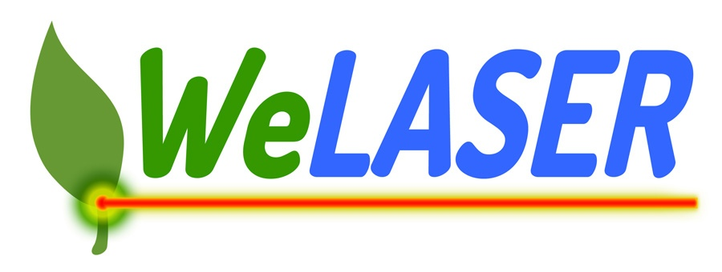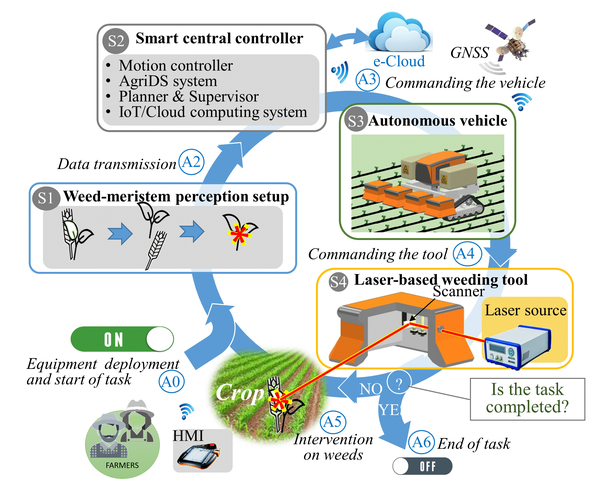Sustainable food security - WeLASER
Introduction
The Horizon 2020 project WeLASER (Eco-innovative weeding with laser) aims to merge current technologies to build, assess and push into the market a precision weeding system based on high-power laser sources and autonomous mobile systems with the main objective of eliminating the use of herbicides while improving productivity and competitiveness. Dr Pablo Gonzalez de Santos, head of Head of the Field and Service Robotics Group at the Spanish National Research Council (CSIC) is coordinating this project with in total 10 partners. This 3-year project started on October 1st, 2020 and will run until September 30th, 2023.
Project description
According to the European Parliament, our production systems should turn out enough food to feed the growing world population. In Europe, agricultural production is guaranteed using about 130 Million tons of synthetic herbicides every year (apart from other chemicals). However, herbicides persist in the environment, destroy non-target plants and beneficial insects for the soil and produce health effects in animals and humans, including cancer, birth defects and disruption of the endocrine system. Moreover, farmers also realize that existing herbicides are becoming less effective due to the evolution and spread of herbicide-resistant weeds, and they would prefer to offer products free of herbicides rather than increasing the doses. Thus, we have to adopt smarter farming methods and build more sustainable food production systems while preserving the environment and health. The EU has regulated and evaluated herbicides for commercial use, but they believe that tools should still be improved to reduce our dependence on herbicides while safeguarding competitiveness. Today, it seems that the only weeding method not using herbicides is mechanical weed control by tillage, but it is fuel-consuming, aggressive for soil and roots and increases erosion. Weed-control approaches based on thermal effects such as spot-flaming or electrical resistance heating on the other hand comply with conservation agriculture but have high energy costs and are not common in the market. Plant-individual irradiation via a laser source allows thermal treatment at moderate energy costs and with few wear parts while conserving the soil. It allows for selective treatment of individual plants, minimizing direct effects of weed control measures on crop plants and animal life.
Consequently, and founded on the EU societal and environmental needs noted by the European Commission in the call SFS-04-2019-2020 – “Integrated health approaches and alternatives to pesticide use”, WeLASER aims to merge current technologies to build, assess and push into the market a precision weeding equipment based on high-power laser sources and autonomous mobile systems with the main objective of eliminating the use of herbicides while improving productivity and competitiveness; such a system would eradicate health risks and environmental adverse effects associated with the use of herbicides.
Objectives
These are the objectives of WeLASER
- To develop an innovative tailor-made, movable, high-power, thulium-doped fibre laser for weeding.
- To develop an advanced artificial-intelligence (AI) detection system (image acquisition and AI-data processing) to provide the positions of the weed meristems (the plants’ sensitive growth centres).
- To build a tool (scanner) to direct the laser source onto the weed meristems in real scenarios.
- To develop a safe autonomous vehicle, based on a proven, innovative and eco-friendly agricultural mobile platform, to carry the weeding system accurately throughout the working field.
- To achieve a minimum impact of WeLASER precision weeding equipment on crops, environment and health
- To develop a smart central controller to coordinate all the systems involved in the precision weeding equipment allowing the farmers to define, execute and supervise their tasks in a reliable, robust and user-friendly way.
- To ensure the commercial viability and exploitation of the proposed WeLASER system through the implementation of a Multi-Actor Approach.
Role of Ghent University
Ghent University is mainly responsible for developing an exploitation plan of the WeLASER precision weeding equipment which includes a business model, business plan, commercialization roadmap and assessment of the economic profitability.
Website
Contact
Prof. dr. Xavier Gellynck
Department Agricultural economics
Phone number: +32 9264 59 53
E-mail

